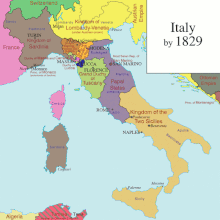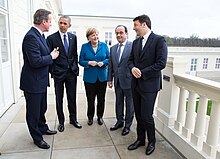In international relations, power is defined in several different ways. Material definitions of state power emphasize economic and military power. Other definitions of power emphasize the ability to structure and constitute the nature of social relations between actors. Power is an attribute of particular actors in their interactions, as well as a social process that constitutes the social identities and capacities of actors.
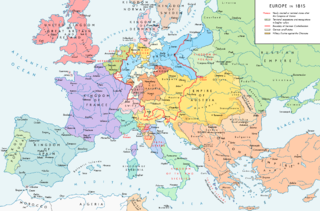
The Concert of Europe was a general consensus among the Great Powers of 19th-century Europe to maintain the European balance of power, political boundaries, and spheres of influence. Never a perfect unity and subject to disputes and jockeying for position and influence, the Concert was an extended period of relative peace and stability in Europe following the Wars of the French Revolution and Napoleonic Wars which had consumed the continent since the 1790s. There is considerable scholarly dispute over the exact nature and duration of the Concert. Some scholars argue that it fell apart nearly as soon as it began in the 1820s when the Great Powers disagreed over the handling of liberal revolts in Italy, while others argue that it lasted until the outbreak of World War I and others for points in between. For those arguing for a longer duration, there is generally agreement that the period after the Revolutions of 1848 and the Crimean War (1853-1856) represented a different phase with different dynamics than the earlier period.
The events preceding World War II in Europe are closely tied to the bellicosity of Fascist Italy, Nazi Germany, and Imperial Japan, as well as the Great Depression. The peace movement led to appeasement and disarmament.

A great power is a sovereign state that is recognized as having the ability and expertise to exert its influence on a global scale. Great powers characteristically possess military and economic strength, as well as diplomatic and soft power influence, which may cause middle or small powers to consider the great powers' opinions before taking actions of their own. International relations theorists have posited that great power status can be characterized into power capabilities, spatial aspects, and status dimensions.
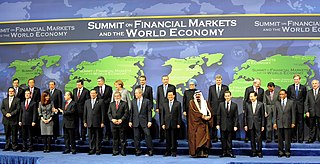
In international relations, a middle power is a sovereign state that is not a great power nor a superpower, but still has large or moderate influence and international recognition.

In international relations, since the late 20th century, the term "regional power" has been used for a sovereign state that exercises significant power within a given geographical region. States that wield unrivaled power and influence within a region of the world possess regional hegemony.

Relations between France and Germany, or Franco-German relations, form an integral part of the wider politics of Europe with both countries being the founders and the main leading Member states of the European Union and its predecessor the European Communities since its inception in 1958 with the signing of the Treaty of Rome.

The Treaty on the Final Settlement with Respect to Germany , or the Two Plus Four Agreement , is an international agreement that allowed the reunification of Germany in the early 1990s. It was negotiated in 1990 between the Federal Republic of Germany and the German Democratic Republic, and the Four Powers which had occupied Germany at the end of World War II in Europe: France, the Soviet Union, the United Kingdom, and the United States. In the treaty, the Four Powers renounced all rights they held in Germany, allowing a reunited Germany to become fully sovereign the following year. At the same time, the two German states agreed to confirm their acceptance of the existing border with Poland, and accepted that the borders of Germany after unification would correspond only to the territories then administered by West and East Germany, with the exclusion and renunciation of any other territorial claims.
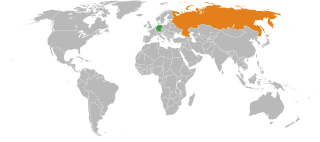
Germany–Russia relations display cyclical patterns, moving back and forth from cooperation and alliance to strain and to total warfare. Historian John Wheeler-Bennett says that since the 1740s:
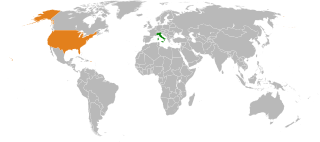
Italy and the United States enjoy warm and friendly relations. The United States has had diplomatic representation in the nation of Italy and its predecessor nation, the Kingdom of Italy, since 1840. However, in 1891 the Italian government severed diplomatic relations and briefly contemplated war against the US as a response to the unresolved case of the lynching of eleven Italians in New Orleans, Louisiana, and there was a break in relations from 1941 to 1943, while Italy and the United States were at war.
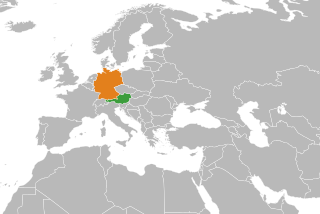
Relations between Austria and Germany are close, due to their shared history and language, with German being the official language of both countries.

NATO is an international military alliance that consists of 30 member states from Europe and North America. It was established at the signing of the North Atlantic Treaty on 4 April 1949. Article 5 of the treaty states that if an armed attack occurs against one of the member states, it shall be considered an attack against all members, and other members shall assist the attacked member, with armed forces if necessary. Article 6 of the treaty limits the scope of Article 5 to the islands north of the Tropic of Cancer, the North American and European mainlands, the entirety of Turkey, and French Algeria. As such, an attack on Hawaii, Puerto Rico, French Guiana, Ceuta, or Melilla, among other places, would not trigger an Article 5 response.
The European balance of power is the tenet in international relations that no single power should be allowed to achieve hegemony over a substantial part of Europe. During much of the Modern Age, the balance was achieved by having a small number of ever-changing alliances contending for power, which culminated in the World Wars of the early 20th century. By 1945, European-led global dominance and rivalry had ended and the doctrine of European balance of power was replaced by a worldwide balance of power involving the United States and the Soviet Union as the modern superpowers.

France–Italy relations refers to international relations between the French Republic and the Italian Republic. Relations occur on the diplomatic, political, military, economic, and cultural level between France and Italy, officially the Italian Republic, and its predecessors, the Kingdom of Sardinia (Piedmont) (1814–1861) and the Kingdom of Italy (1861–1946).

This article covers worldwide diplomacy and, more generally, the international relations of the great powers from 1814 to 1919. This era covers the period from the end of the Napoleonic Wars and the Congress of Vienna (1814–15), to the end of the First World War and the Paris Peace Conference (1919–20).
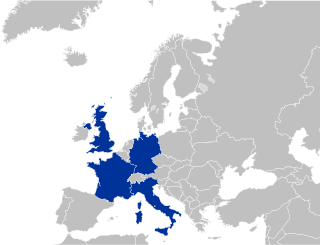
The Big Four, also known as G4, refers to France, Germany, Italy and the United Kingdom. France and the United Kingdom are official nuclear-weapon states and are permanent members of the United Nations Security Council with the power of veto, which enables any one of them to prevent the adoption of any "substantive" draft Council resolution, regardless of its level of international support. The United Kingdom is the only country of the Big Four which is not a member state of the European Union having ended its membership in 2020 after a referendum was held in 2016 which resulted in a small majority vote in favour of leaving the bloc. France, Germany, Italy and the United Kingdom are considered major European economic powers and they are the Western European countries individually represented as full members of the G7 and the G20. They have been referred to as the "Big Four of Europe" since the interwar period. The term G4 was used for the first time when French President Nicolas Sarkozy called for a meeting in Paris with Italian Prime Minister Silvio Berlusconi, Prime Minister of the United Kingdom Gordon Brown and Chancellor of Germany Angela Merkel to consider the response to the financial crisis during the Great Recession. The Organisation for Economic Co-operation and Development describes them as the "Four Big European Countries".

The Italian nuclear weapons program was an effort by Italy to develop nuclear weapons in the late 1960s and early 1970s. Italian scientists like Enrico Fermi and Edoardo Amaldi had been at the forefront of the development of the technology behind nuclear weapons, but the country was banned from developing the technology at the end of the Second World War. After abortive proposals to establish a multilateral program with NATO Allies in the 1950s and 1960s, Italy launched a national nuclear weapons program. The country converted the light cruiser Giuseppe Garibaldi and developed and tested a ballistic missile called Alfa. The program ended in 1975 upon Italy's accession to the Non-Proliferation Treaty. Currently, Italy does not produce or possess nuclear weapons but takes part in the NATO nuclear sharing program, hosting B61 nuclear bombs at the Aviano and Ghedi Air Bases.

